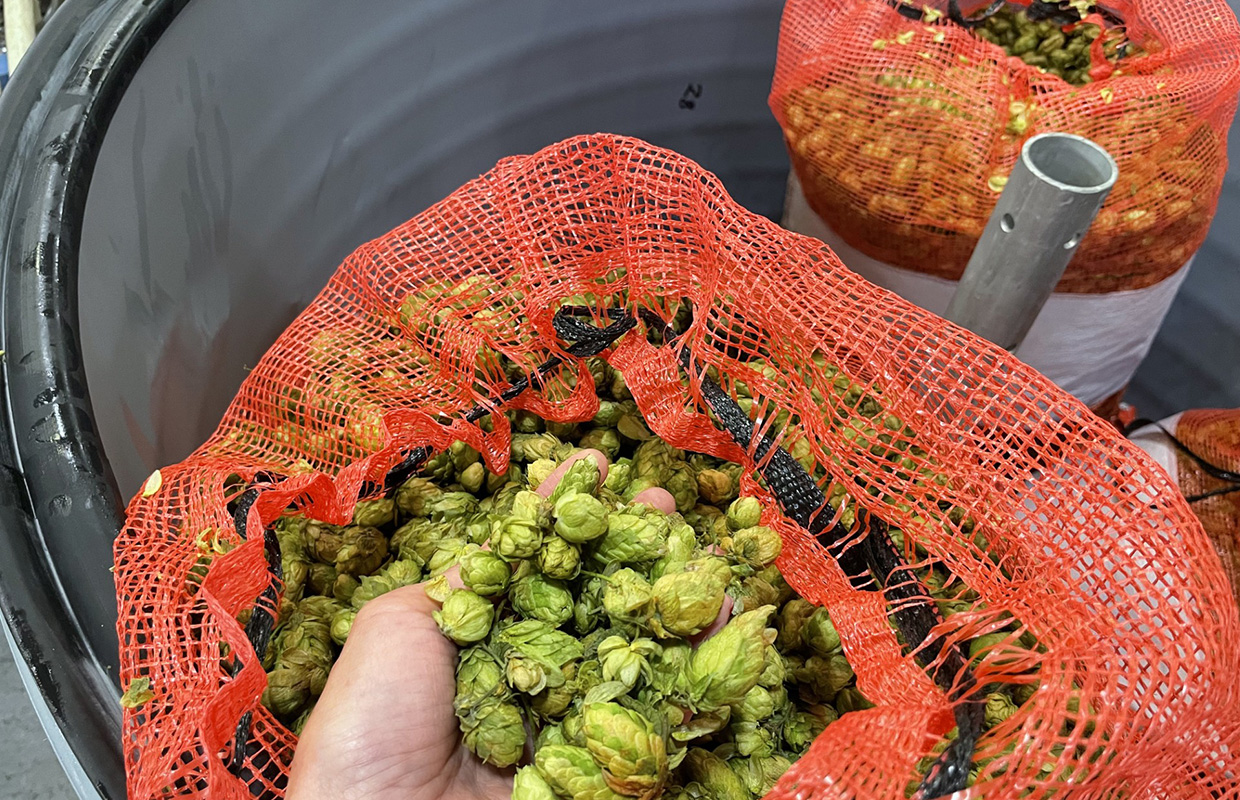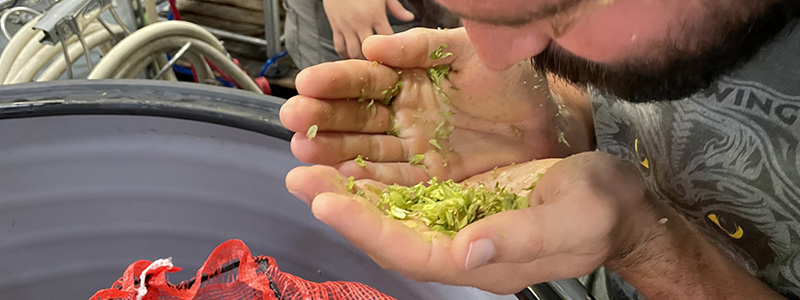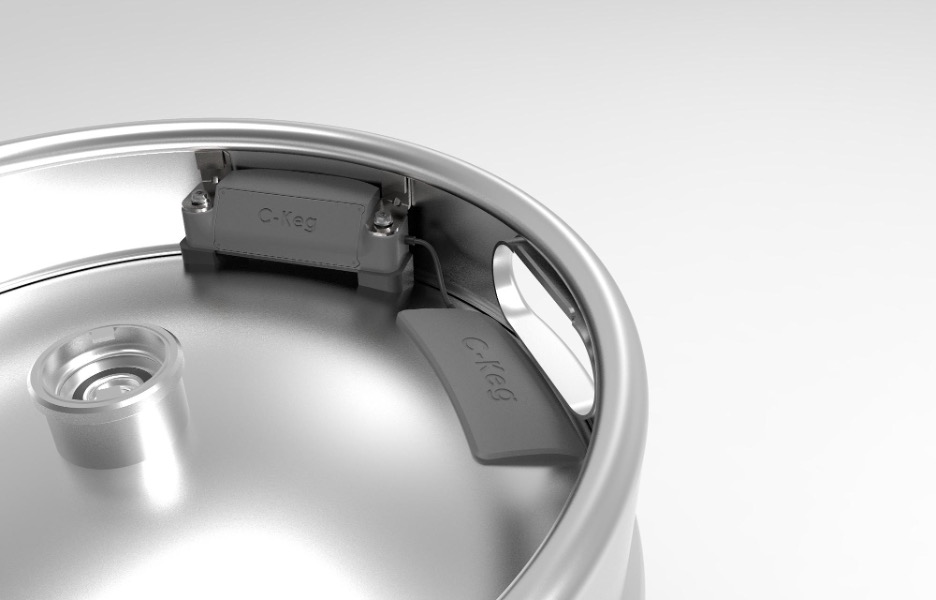
At the start, Idaho hop processor Mill 95 did not store fresh hops.
Hops were bagged at the farm directly off of the conveyer belt from the picker, and were used as soon as possible by regional brewers, explained Amaya Aguirre-Landa, the Marketing & Communications Manager for Mill 95.
For Washington’s Oasis Farms, they began storing fresh hops with RipeLocker’s proprietary storage vessels and saw an impact in continued freshness.
“We store in RipeLocker … at a temperature of 32 degrees Fahrenheit,” explained Oasis Farms president Brenton Roy. “The vessels hold 200 pounds of fresh hops for over 50 days in ‘just harvested’ condition.”
One of the unforeseen benefits of being able to store fresh hops longer is shipping efficiencies. Historically, fresh hops, like many perishable agricultural products, had to be shipped quickly to avoid spoilage. This often necessitates expedited shipping methods like airfreight if brewers are not within driving distance of receiving the hops. Having longer storage times means that fresh hops can now be shipped more economically using more sustainable transportation methods like trucks or ships to breweries farther away from the grower. This can result in reduced air shipping costs, lower carbon emissions, and more sustainable supply chains overall. Additionally, longer storage times can also help to smooth out seasonal fluctuations in supply and demand, reducing price volatility and making it easier for breweries to plan their purchasing and production schedules. Overall, the ability to store fresh hops longer can have a positive impact on both the economic and environmental sustainability of the brewing industry. “We are now able to ship multiple varieties with different harvest windows at the same time,” Aguirre-Landa said about Mill 95, adding that is decreases costs and emissions while improving efficiencies.
It is difficult to predict all the effects of fresh hop storage, Roy added.
“The applications are only limited by our collective imagination,” he said. “The RipeLocker is an innovation that has resulted in an almost new product. Those unable to use fresh hops in the past now have that option available.
“I dream of exporting a load of fresh hops to places that would truly appreciate the unique beer they can help create. Brazil is a good example. Because of the logistical challenges, I imagine zero fresh hop ales have been commercially produced there. Now it is a distinct possibility.”

BREWER: Why is fresh hops storage and extension of its season important for a brewer?
ROY: First and most importantly, quality. Fresh hops degrade quickly, but in the vacuum of RipeLocker, we can suspend them and maintain genuine freshness. Secondly, fresh hop storage allows for the brewer to utilize multiple varieties in single fresh hop beer. Without storage that is an extremely difficult endeavor because growers harvest hops one variety at a time and without storage, fresh hops need to be used immediately. Additionally, storage allows for season extension and the brewer schedule flexibility. A typical fresh hop project is harvest (which is itself not entirely without scheduling challenges), pickup up or package, mail, followed by immediate use by the brewer. RipeLocker allows for much more flexibility. Upon harvest we select the lots that are best suited for fresh use, cool them, load them into a RipeLocker, and then deliver to the brewery when ordered. The window for use is seven-plus weeks.
AGUIRRE-LANDA: By utilizing RipeLocker technology, Mill 95 is able to provide fresh hops to brewers outside of the Idaho hop growing region, and allows for greater flexibility in fresh hop brewing schedule. For example, if a brewer wants to create a fresh hop beer with two hop varieties with different picking windows, now they can. The earlier picked variety can be held in RipeLocker awaiting the harvest date of the later variety. Then, once the later variety is harvested the two can be shipped.
BREWER: Have you gotten any feedback from brewers or customers about the difference in the beer?
ROY: They are amazed by the freshness. One brewer, located on the East Coast, termed it “hour zero” quality. Essentially a typical shipped fresh hop will be held in an ice-packed box for 48-72-plus hours. A RipeLocker stored hop will hold for 55 days while maintaining the quality of a hop just off the bine. Additionally, some brewers have commented on the vegetative characteristics being muted in a RipeLocker stored hop. The hop oils stand out a bit more.
AGUIRRE-LANDA: The overwhelming feedback from brewers that we have received is how impressed they were with the quality of fresh hops that they received. The expectation of brewers that were familiar with getting hops fresh from the farm or utilizing overnight airfreight were exceeded with the use of RipeLocker.
BREWER: Is investing in fresh hop storage with RipeLocker worth it financially?
AGUIRRE-LANDA: If a brewery is located outside of a major hop growing region, the quality of fresh hops they will be able to receive using RipeLocker is unmatched. The logistics of accessing fresh hops outside of growing regions is a commitment in and of itself, it is worth it to the brewer to ensure that the fresh hops they receive are of the best quality.
ROY: That depends on your view of the business. Innovation is almost always difficult, and challenging. At Oasis we have found RipeLocker stored hops to be a new profit center, but more importantly, it has provided us with the thrill of exploration within the industry. My family has been growing hops for well over 100 years. It is profoundly important to our company, our culture, and our passion for beer. The RipeLocker endeavor is new, exciting, and a pure joy to offer to the brewing industry.
BREWER: What advice would you give other growers about storing fresh hops?
AGUIRRE-LANDA: If a brewery is interested in sourcing fresh hops using RipeLocker, contact your sale executive to discuss the logistics to ensure you have the best possible outcome.






1 Trackback / Pingback